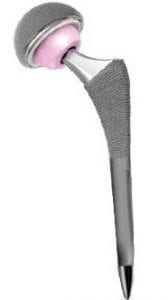 (Nov. 17, 2017) Johnson & Johnson was ordered by a Dallas jury to pay $247 million to six people who claimed J&J hid defects in its Pinnacle artificial hips. It was the third multi-million-dollar verdict against J&J over its defective metal-on-metal hip implants.
(Nov. 17, 2017) Johnson & Johnson was ordered by a Dallas jury to pay $247 million to six people who claimed J&J hid defects in its Pinnacle artificial hips. It was the third multi-million-dollar verdict against J&J over its defective metal-on-metal hip implants.The jury ruled yesterday that J&J’s DePuy unit officials knew the hip devices they made were defective, yet failed to warn doctors and patients about the risk that they would prematurely fail. The jury awarded $79 million in actual damages, plus $168 million in punitive damages to a group of six New Yorkers whose hips required surgical removal.
Nearly 10,000 lawsuits have now been filed against J&J and DePuy over the company’s mishandling of the metal-on-metal hips. J&J stopped selling the hip replacement devices in 2013 after the U.S. FDA toughened artificial-hip regulations.
A lawyer handling the cases called the medical device companies’ behavior “so reprehensible” as to demand “repeated punishment.”
In an emailed statement, J&J spokesmodel Stella Meirelles claimed the company acted “appropriately and responsibly” in developing and marketing the Pinnacle hips. She said the company would “immediately begin the appeal process and remain committed to the long-term defense of the allegations in these lawsuits.”
J&J 1-3 Record in Pinnacle Hip Cases
In October 2014, Johnson & Johnson won the first Pinnacle hip case to go to trial, when a federal court jury in Dallas rejected a Montana woman’s claims that the devices were defective and gave her metal poisoning.
$502 Million Verdict
In 2016, another Dallas jury ordered J&J to pay $498 million to a group of five people who accused the company of hiding defects in the artificial hips. In July 2017, a judge slashed that verdict to about $150 million.
$1 Billion Verdict
Earlier in 2017, a third Dallas jury ordered J&J and DePuy to pay more than $1 billion to six California residents whose hips had to be removed after failing. That award was later slashed by nearly half.
$2.5 Billion Settlement
The Pinnacle hip devices were not covered by J&J’s $2.5 billion settlement of claims over its ASR line of artificial hips. Johnson & Johnson recalled 93,000 of those implants worldwide in August 2010, admitting that 12 percent failed within five years.
The metal-on-metal Pinnacle hip cases have been consolidated before U.S. District Judge Ed Kinkeade in Dallas for pretrial information exchanges and test (or bellwether) trials. Judge Kinkeade agreed to combine the six cases in the most recent trial.
The six New York plaintiffs in the latest Dallas trial are a physician (88 years old); an elementary school teacher (67); a chauffeur (61); a housing official (60); a health-care aide (53); a financial analyst (52).
Plaintiffs in the latest trial argued that DePuy officials rushed the Pinnacle hips to market with little testing, and misled doctors about the product’s safety profile. They erroneously assured doctors that there was little risk of metal poisoning and tissue damage from the metal-on-metal hip device.
Metal on Metal Problem for Johnson & Johnson
The plaintiffs’ attorney in closing argument told the jury that the company “ran a grand seduction.” He said, “Surgeons were seduced into using metal-on-metal” by DePuy executives’ false claim that the company had “solved the metal-on-metal problem.”
J&J’s lawyers argued that the hip devices failed because of routine wear-and-tear. They denied that the hip device design was flawed. They argued that the company marketed the product properly.
Hip Implant Verdict against Johnson & Johnson: $247 Million
Jurors found that J&J and DePuy relied on “intentional misrepresentations” about the hip device’s safety profile to bolster sales. According to a verdict form, the jury found that J&J and DePuy engaged in “deceptive business practices” when they marketed the defective devices.
Hip Implant Lawsuit
If you or someone you love was implanted with a metal-on-metal hip implant that failed, contact our experienced medical device lawyers today for a free legal consultation.
Related
- DePuy Hip Replacement Lawsuit | Lawyer
- Defective Hip Implant Verdict: $1 Billion
- DePuy Hip Veredict: $98 Million
- Biomet Hip Implant Lawsuit
- Medical Device Lawsuit

by Matthews & Associates




